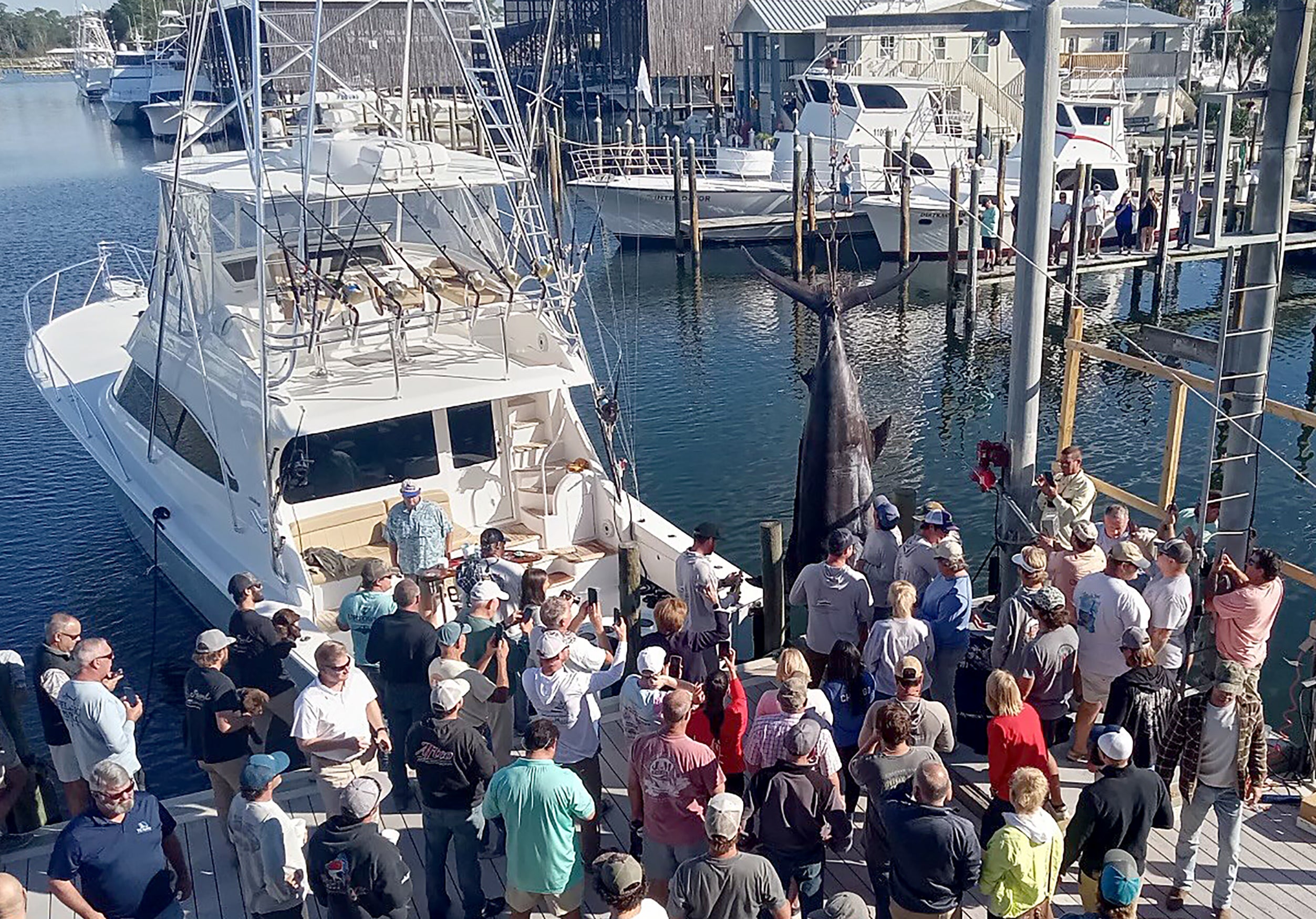By DAVID RAINER, Alabama Department of Conservation and Natural Resources
As saltwater fishing for 2024 heads into the peak seasons, a look back at 2023 reveals another record-breaking year for those who fish Alabama’s coastal waters and the Gulf of Mexico.
The catch that went viral with news agencies around the world picking up the story was the giant blue marlin caught by “Best Trait,” a 55-foot Viking sportfishing vessel owned by Scott Crump of Jasper. The marlin officially weighed 1,145.6 pounds, which is not only an Alabama but also a Gulf of Mexico record. The Best Trait marlin, which was 145 inches long, easily eclipsed the Alabama state record of 851.9 pounds caught in 2020 by Ginger Myers. The Gulf record was set in 2002 in Mississippi by Barry Carr at 1,054 pounds.
Scott “Scooter” Anderson reeled in the giant marlin in two hours, but he said it was far from easy, losing two fish before getting the big bite.
Capt. Chris Mowad went to the Blind Faith rig, Chevron’s deepest rig at 6,500 feet about 160 miles southeast of New Orleans. The fishing team put down a blackfin tuna for bait, and Mowad watched the big blue marlin hit it on the sonar. The marlin came to the surface and started jumping. She came completely out of the water twice, Anderson said.
An hour into the fight, the marlin died and began to sink. A combination of a lot of reeling by Anderson and boat maneuvering by Mowad got the marlin alongside the boat. The fish was so big, they had to call a nearby boat to come help get it loaded. It took seven anglers to get the monster blue into the boat.
Scott Bannon, Director of the Alabama Department of Conservation and Natural Resources’ (ADCNR) Marine Resources Division (MRD), said a marlin weighing more than 1,000 pounds, known as a grander, is obviously an extremely rare occurrence.
“This fish was almost 300 pounds larger than the previous record,” Bannon said. “We just don’t see fish that big in the Gulf.
“Credit goes to those bigger boats and the tournaments hosted out of Orange Beach. We have become very well known for our offshore fishing tournaments. I think that brings awareness to the fishing in Alabama, and, naturally, it brings income to Alabama as people who are fishing spend money in the local economy. We’re proud to be known as a world-class fishing destination.”
Another record-breaker that caused quite a stir was the gigantic tiger shark caught during the 2023 Alabama Deep Sea Fishing Rodeo by Brett Rutledge. The tiger shark weighed 1,019 pounds, bumping the 988 pounds, 8 ounces fish caught by Larry Eberly that held the Alabama record since 1990.
Rutledge’s record fish was certainly not caught by accident. He took his daughter and a friend out the day before the rodeo started to catch jack crevalle and bonitos to use for bait as well as collecting about 400 pounds of baitfish, like menhaden, for chum. When they’re looking for fishing spots, it’s all about the abundance of bait around petroleum rigs, artificial reefs or natural bottom.
“I also got up early every morning to build shark leaders for two weeks,” Rutledge said. “I built different ones for different applications, depending on the bait we were using. We use 22/0 circle hooks for shark fishing with 700-pound stainless leader.
“We want to use big enough tackle to be able to manhandle a fish. I got that fish to the boat in 30 minutes. We had that shark roped to the boat in 36 minutes total. It took another hour and a half to get it in the boat.”
Rutledge said he realized this was a huge shark about 15 minutes into the fight when fishing mate Derrick Rogers spotted the fish and said it was “real long and real girthy.” David Rogers, Connor Blake and Joey Spiers were his other fishing partners.
“I didn’t think the fish was 1,000 pounds, so I was happy when they called out the numbers,” he said. “Derrick and Connor are really good shark fishermen. I did the easy part. I reeled it in. The hard part was what they did when they roped it and got it inside the boat.”
Bannon said the shark category at the rodeo allows marine scientists access to species that are rarely available to study.
“The public likes to see those big sharks, and that was a big one,” Bannon said. “On the science side of things, when those species are brought in, Dauphin Island Sea Lab and the University of South Alabama are able to obtain so much scientific data on those species they don’t see very often. So, there are benefits to those limited species of sharks being landed to be used for scientific purposes.”









